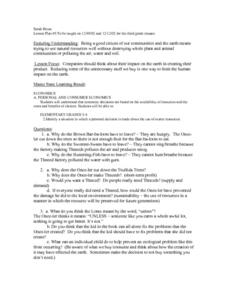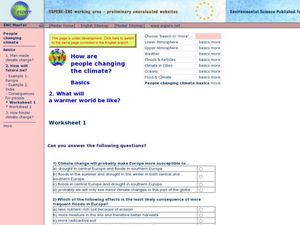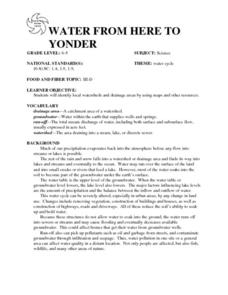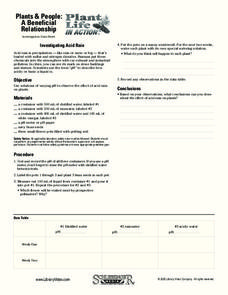Curated OER
Economics -- Third Grade
Third graders read the Dr. Seuss book The Lorax. In groups, they answer questions that are related to economics and distribution of goods. They also identify the environmental issues present in the book and perform a skit in front of the...
Curated OER
Natural Gardening
Students study the effect of pesticides on plants and insects. In this gardening lesson, students discuss the importance of insects. They define pesticides, evaluate their effectiveness and the problems they might cause. Students...
Curated OER
Renewable vs. Non-Renewable Resources
Fifth graders, after brainstorming why conservation of resources is important, distinguish between renewable and non-renewable resources. They make a list of different types of natural resources on the board and then sort them into two...
Curated OER
How are People Changing the Climate: Basics
In this climate change worksheet, students answer a series of questions about climate change. Students have multiple choice options for six online quiz questions
Curated OER
The Urban Heat Island Effect - Lesson 2 (Grades 8-9)
Students use the scientific process to show that when various surfaces are exposed to similar environmental conditions, surface temperatures may vary. They examine the "urban heat island" phenomenon and analyze why it increases energy...
Curated OER
Food Chains Are Not A Necklace!
Second graders examine how food chains interact with different plants and animals. They practice using new vocabulary. They also discover the role of pesticides in the environment.
Curated OER
Mangrove Ecology and Adaptations
Students create a plant or animal that would be well adapted to a habitat they selected. They first learn about Mangroves and their specific adaptations that help them survive in their habitat.
Curated OER
Mangrove Ecology & Adaptations
Students creat a plant, animal, or other living organism that would be well adapted to a habitat that they previously selected. First they learn about adaptations of Mangroves.
Curated OER
Renewable vs. Non-Renewable Resources
Fifth graders identify renewable vs. non-renewable resources and comprehend why conservation of resources is important. They are asked what they think the words natural and resource mean. Pupils then put the words together to define...
Curated OER
Don't Trash the Earth
Learners experience a hands-on environmental science project. They access about recycling as they collect data on their own family's trash production. Students analyze the data with worksheets, chart the data, and present their findings.
Curated OER
WATER FROM HERE TO YONDER
Students identify local watersheds and drainage areas by using maps and other resources. They are given copies of the water cycle. Students discuss the movement of water in the environment. They observe, record and transfer information...
Curated OER
Living or Nonliving
Third graders brainstorm a list of the characteristics of living and nonliving organisms. Individually, they find four nonliving and living items and the characteristics that make them fit into one of the categories. To end the...
Curated OER
Ecology Worksheet
In this environment worksheet, learners engage in the completion of 32 sentences to find the word that is used to complete the thoughts.
Curated OER
Look At A Landfill
Students explore how landfills function. In this landfill activity, students explore the use of landfills and the decomposition process by creating a model landfill. Students discuss pros and cons to landfills and how potential...
Curated OER
Horticulture Crops in the agro-ecosystem
Ninth graders apply ecological analysis to fruit and vegetable production systems. In this horticulture lesson students learn about different management practices.
Curated OER
Mighty Macroinvertebrates
Seventh graders identify the names and features of macroinvertebrates found in Turtle River. In this ecology lesson students use digital microscopes and take pictures of invertebrates.
Curated OER
The Captain And Lake Wilmar
Tenth graders examine the ecosystem of Lake Wilmar through three coordinated performance tasks. They first investigate the effects of pH on freshwater animals by comparing the zooplankton counts from three different areas. They then...
Curated OER
Create a Commercial
Young scholars apply their knowledge of the persuasive appeals by creating a commercial which uses one or more of the three appeals (logos, pathos, and ethos) in order to persuade. They also differentiate among the three appeals as used...
Curated OER
The Water Cycle
Students list the nine places on earth where water is found. They define the terms cycle and water cycle. Students explain how energy from the sun powers the movement of water molecules through the water cycle. They name and describe...
Curated OER
Agriculture Scavenger Hunt
In this science worksheet, students find the words that are related to the finding of terms and information about agriculture for ten questions. The answers are on page 3.
Curated OER
Social Change and Modernization
In this social change and modernization worksheet, pupils respond to 6 short answer questions and answer 6 multiple choice questions regarding these sociology topics.
Curated OER
Safe Subs
Students investigate ways to reduce use of hazardous materials. In this safe substitutes lesson, students review hazardous wastes used in many homes and possible safe substitutes for these harmful chemicals. Students write and decorate...
Curated OER
Rain Forest Rally
Eighth graders study tropical and temperate rainforests. In this rainforest lesson students complete a lab activity using the Internet.
Curated OER
Plant Life In Action
Int his plant worksheet, students folllow the given directions to create an experiment. Students then answer 5 short answer questions and complete the given data table with results for two weeks.























